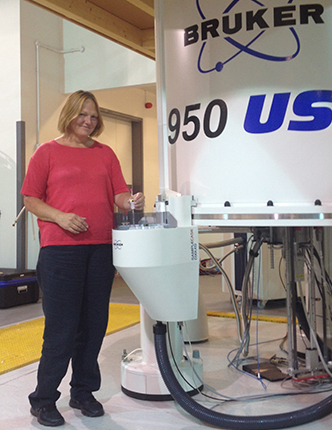Returning to the forefront of drug discovery and development has been a dream come true
Julia was a senior research scientist at a major pharmaceutical company when she became ill. Up to this point, she had had an illustrious research career, starting in 1982 with a BSC in Chemistry and Food Science at Kings College London.
In 2010, Julia’s health began to decline. She first experienced symptoms of the autoimmune disease, lupus, at University. Julia suffered an acute flare, where she was unable to get out of bed most mornings due to the chronic, pain in her joints and extreme fatigue. She was also struggling to self-manage her type 1 diabetes as the autoimmune conditions negatively interact.
I thought my scientific career was over
The severity of her condition meant that she was forced to take sick leave for 18 months so she could focus on her recovery. She underwent steroid therapy, chemotherapy and a full range of diagnostic treatments.
Julia says: “There were times when I was sleeping up to 20 hours a day, my eyesight was blurred and I couldn’t hold a mug because my joints were too painful.”
Fortunately, Julia’s health did improve, and with her lupus and diabetes under control, she restarted work on a part-time basis in a desk-based role, training as a Patent Attorney. However, she always hoped she would be able to return to working at the forefront of drug discovery in the lab one day, a job she loved.
When Julia moved on from working in pharmaceuticals in 2015, she started to seriously contemplate how she could make her return to academic research happen.
Julia says: “A friend told me about the Fellowship scheme offered by the Daphne Jackson Trust. The mentoring, support, provision for retraining and general understanding of all aspects for a return to research, as offered by a Daphne Jackson Fellowship, were ideal for me.
“I knew I needed to retrain, to refresh and redevelop my laboratory skills. I also felt it was important to learn to balance the maintenance of my health conditions with the demands of a research career. I decided that the best solution would be to work in an area where I had already had some experience and be based in a laboratory where I was familiar”.
Julia approached a former collaborator from her pharmaceutical career, who also worked at the newly opened Francis Crick Institute in London for his advice. With her collaborator’s enthusiasm about applying for a Daphne Jackson Fellowship, Julia set to work on her research project.
Julia says: “I was determined, yet still had many of moments of self-doubt when writing my research project. My Fellowship Advisor Helen checked in on me regularly and our phone conversations really helped to rebuild my confidence. The charity really understands that someone cannot simply return to where they left off, as science moves forward so quickly and the environment around us changes.”
Julia’s Fellowship is allowing her to gain specific training in an important and widely applicable biophysical technique of relevance to biomedical problems.
Julia says: “I see my Fellowship as a direct route for me to re-enter and restart a biomedical research career. I now feel up to date with cutting edge structural biology approaches and just over a year into my fellowship I’m fortunate that my research project has already produced two publications.”
Julia’s tips for returners
- Keep up to date with the latest scientific research by reading scientific literature and through peer review for example grant proposals.
- Be proactive. Ask questions, keep up conversations with previous collaborators.
- Remember to network, network, network!
Dr Hubbard’s Fellowship was sponsored by the Royal Society of Chemistry and Medical Research Council. The Fellowship was hosted by The Francis Crick Institute under the supervision of Dr Gamblin.

